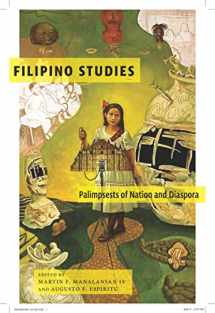
Filipino Studies: Palimpsests of Nation and Diaspora
ISBN-13:
9781479829057
ISBN-10:
1479829056
Author:
Martin F. Manalansan, Augusto Espiritu
Publication date:
2016
Publisher:
NYU Press
Format:
Hardcover
464 pages
FREE US shipping
Book details
ISBN-13:
9781479829057
ISBN-10:
1479829056
Author:
Martin F. Manalansan, Augusto Espiritu
Publication date:
2016
Publisher:
NYU Press
Format:
Hardcover
464 pages
Summary
Filipino Studies: Palimpsests of Nation and Diaspora (ISBN-13: 9781479829057 and ISBN-10: 1479829056), written by authors
Martin F. Manalansan, Augusto Espiritu, was published by NYU Press in 2016.
With an overall rating of 4.4 stars, it's a notable title among other
books. You can easily purchase or rent Filipino Studies: Palimpsests of Nation and Diaspora (Hardcover) from BooksRun,
along with many other new and used
books
and textbooks.
And, if you're looking to sell your copy, our current buyback offer is $0.3.
Description
After years of occupying a vexed position in the American academy, Philippine studies has come into its own, emerging as a trenchant and dynamic space of inquiry. Filipino Studies is a field-defining collection of vibrant voices, critical perspectives, and provocative ideas about the cultural, political, and economic state of the Philippines and its diaspora. Traversing issues of colonialism, neoliberalism, globalization, and nationalism, this volume examines not only the past and present position of the Philippines and its people, but also advances new frameworks for re-conceptualizing this growing field. Written by a prestigious lineup of international scholars grappling with the legacies of colonialism and imperial power, the essays examine both the genealogy of the Philippines’ hyphenated identity as well as the future trajectory of the field. Hailing from multiple disciplines in the humanities and social sciences, the contributors revisit and contest traditional renditions of Philippine colonial histories, from racial formations and the Japanese occupation to the Cold War and “independence” from the United States. Whether addressing the contested memories of World War II, the “voyage” of Filipino men and women into the U.S. metropole, or migrant labor and the notion of home, the assembled essays tease out the links between the past and present, with a hopeful longing for various futures. Filipino Studies makes bold declarations about the productive frameworks that open up new archives and innovative landscapes of knowledge for Filipino and Filipino American Studies.


We would LOVE it if you could help us and other readers by reviewing the book
Book review

Congratulations! We have received your book review.
{user}
{createdAt}
by {truncated_author}


